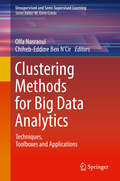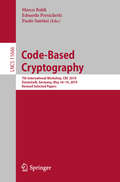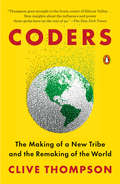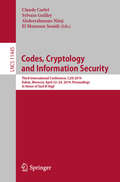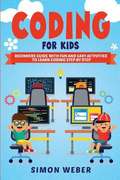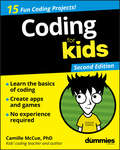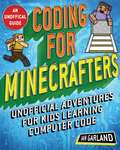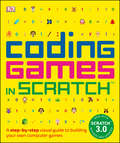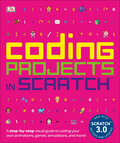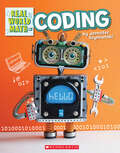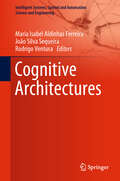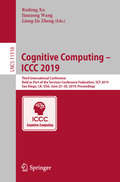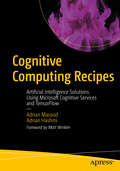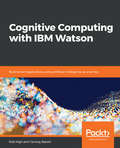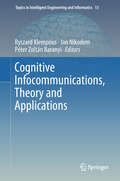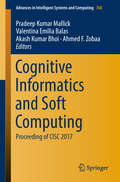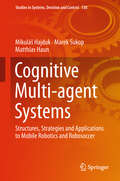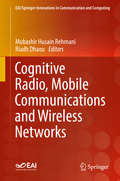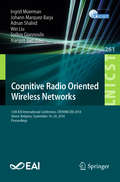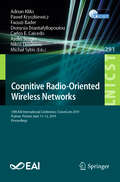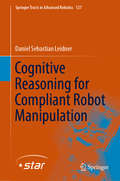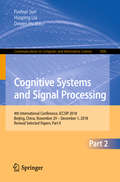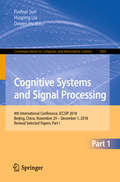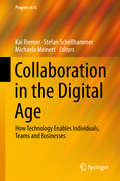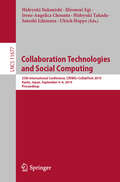- Table View
- List View
Clustering Methods for Big Data Analytics: Techniques, Toolboxes and Applications (Unsupervised and Semi-Supervised Learning)
by Olfa Nasraoui Chiheb-Eddine Ben N'CirThis book highlights the state of the art and recent advances in Big Data clustering methods and their innovative applications in contemporary AI-driven systems. The book chapters discuss Deep Learning for Clustering, Blockchain data clustering, Cybersecurity applications such as insider threat detection, scalable distributed clustering methods for massive volumes of data; clustering Big Data Streams such as streams generated by the confluence of Internet of Things, digital and mobile health, human-robot interaction, and social networks; Spark-based Big Data clustering using Particle Swarm Optimization; and Tensor-based clustering for Web graphs, sensor streams, and social networks. The chapters in the book include a balanced coverage of big data clustering theory, methods, tools, frameworks, applications, representation, visualization, and clustering validation.
Code-Based Cryptography: 7th International Workshop, CBC 2019, Darmstadt, Germany, May 18–19, 2019, Revised Selected Papers (Lecture Notes in Computer Science #11666)
by Marco Baldi Edoardo Persichetti Paolo SantiniThis book constitutes the refereed and revised post-conference proceedings of the 7th International Workshop on Code-Based Cryptography, CBC 2019, held in Darmstadt, Germany, in May 2019. The eight papers presented in this book were carefully reviewed and selected from numerous submissions. These contributions are divided into two groups: The first four papers deal with the design of code-based cryptosystems, while the following four papers are on cryptanalysis of code-based cryptosystems.
Coders: The Making of a New Tribe and the Remaking of the World
by Clive ThompsonHello, world.Facebook's algorithms shaping the news. Self-driving cars roaming the streets. Revolution on Twitter and romance on Tinder. We live in a world constructed of code--and coders are the ones who built it for us. From acclaimed tech writer Clive Thompson comes a brilliant anthropological reckoning with the most powerful tribe in the world today, computer programmers, in a book that interrogates who they are, how they think, what qualifies as greatness in their world, and what should give us pause. They are the most quietly influential people on the planet, and Coders shines a light on their culture.In pop culture and media, the people who create the code that rules our world are regularly portrayed in hackneyed, simplified terms, as ciphers in hoodies. Thompson goes far deeper, dramatizing the psychology of the invisible architects of the culture, exploring their passions and their values, as well as their messy history. In nuanced portraits, Coders takes us close to some of the great programmers of our time, including the creators of Facebook's News Feed, Instagram, Google's cutting-edge AI, and more. Speaking to everyone from revered "10X" elites to neophytes, back-end engineers and front-end designers, Thompson explores the distinctive psychology of this vocation--which combines a love of logic, an obsession with efficiency, the joy of puzzle-solving, and a superhuman tolerance for mind-bending frustration. Along the way, Coders thoughtfully ponders the morality and politics of code, including its implications for civic life and the economy. Programmers shape our everyday behavior: When they make something easy to do, we do more of it. When they make it hard or impossible, we do less of it. Thompson wrestles with the major controversies of our era, from the "disruption" fetish of Silicon Valley to the struggle for inclusion by marginalized groups.In his accessible, erudite style, Thompson unpacks the surprising history of the field, beginning with the first coders -- brilliant and pioneering women, who, despite crafting some of the earliest personal computers and programming languages, were later written out of history. Coders introduces modern crypto-hackers fighting for your privacy, AI engineers building eerie new forms of machine cognition, teenage girls losing sleep at 24/7 hackathons, and unemployed Kentucky coal-miners learning a new career. At the same time, the book deftly illustrates how programming has become a marvelous new art form--a source of delight and creativity, not merely danger. To get as close to his subject as possible, Thompson picks up the thread of his own long-abandoned coding skills as he reckons, in his signature, highly personal style, with what superb programming looks like. To understand the world today, we need to understand code and its consequences. With Coders, Thompson gives a definitive look into the heart of the machine.
Codes, Cryptology and Information Security: Third International Conference, C2SI 2019, Rabat, Morocco, April 22–24, 2019, Proceedings - In Honor of Said El Hajji (Lecture Notes in Computer Science #11445)
by Claude Carlet Sylvain Guilley Abderrahmane Nitaj El Mamoun SouidiThis book constitutes the proceedings of the Third International Conference on Codes, Cryptology and Information Security, C2SI 2019, held in Rabat, Morocco, in April 2019. The 19 regular papers presented together with 5 invited talks were carefully reviewed and selected from 90 submissions. The first aim of this conference is to pay homage to Said El Hajji for his valuable contribution in research, teaching and disseminating knowledge in numerical analysis, modeling and information security in Morocco, Africa, and worldwide. The second aim of the conference is to provide an international forum for researchers from academia and practitioners from industry from all over the world for discussion of all forms of cryptology, coding theory, and information security.
Coding for Kids: Beginners Guide With Fun And Easy Activities To Learn Coding Step By Step
by Simon WeberThis book is intended for children who wish to learn programming and computing. In this day and age, computer knowledge, or literacy, if we may call it that, is of huge importance for every person, from early childhood on through to his or her adult, professional lives. Even in the preschool system, children very often have tasks given to them by their teachers, which require the use of computers to a certain extent. That is precisely the reason this book would be of good use both for teachers and for children. Teachers will get help on the topic of how to bring the computer closer to children, and children get the opportunity to learn their first basic knowledge of computers and their use. They also get their first clues on the benefits computers can bring to them and their lives.
Coding For Kids For Dummies (For Kids For Dummies)
by Camille McCue Ph.DA guide for kids who want to learn coding Coding is quickly becoming an essential academic skill, right up there with reading, writing, and arithmetic. This book is an ideal way for young learners ages 8-13 who want more coding knowledge than you can learn in an hour, a day, or a week. Written by a classroom instructor with over a decade of experience teaching technology skills to kids as young as five, this book teaches the steps and logic needed to write code, solve problems, and create fun games and animations using projects based in Scratch and JavaScript. This 2nd Edition is fully updated to no longer require any limited-time software downloads to complete the projects. Learn the unique logic behind writing computer code Use simple coding tools ideal for teaching kids and beginners Build games and animations you can show off to friends Add motion and interactivity to your projects Whether you’re a kid ready to make fun things using technology or a parent, teacher, or mentor looking to introduce coding in an eager child’s life, this fun book makes getting started with coding fun and easy!
Coding for Minecrafters: Unofficial Adventures for Kids Learning Computer Code
by Ian GarlandLearn to Code while Adventuring through the Overworld!This fun and educational activity book Introduces kids to the world of coding through the Minecraft world they love. Colorfully illustrated characters and themes from their favorite video game bring the excitement of coding to life, while easy-to-follow screenshots guide them through activities. With adventures that include design, music, animation, gaming, and more, learners will discover tons of ways coding connects to other activities they love and how far a little imagination and invention can take them…to The End and beyond! Minecrafting-themed characters help kids become master coders Kid-friendly concepts and steps designed specifically for ages 8-12 Great games, mods, experiments, and more teach computational thinking—how to tackle large problems by breaking them down into a sequence of smaller, more manageable problems Whether brand-new to coding or looking for more hands-on learning, Coding for Minecrafters helps young coders advance in technology education by leaps and bounds—and have fun doing it!
Coding Games in Scratch: A Step-by-Step Visual Guide to Building Your Own Computer Games (DK Help Your Kids)
by Jon WoodcockScratch 3.0 has landed! Stay ahead of the curve with this fully updated guide for beginner coders.Coding is not only a highly sought-after skill in our digital world, but it also teaches kids valuable skills for life after school. This book teaches important strategies for solving problems, designing projects, and communicating ideas, all while creating games to play with their friends.Children will enjoy the step-by-step visual approach that makes even the most difficult coding concepts easy to master. They will discover the fundamentals of computer programming and learn to code through a blend of coding theory and the practical task of building computer games themselves. The reason coding theory is taught through practical tasks is so that young programmers don't just learn how computer code works - they learn why it's done that way. With Coding Games in Scratch, kids can build single and multiplayer platform games, create puzzles and memory games, race through mazes, add animation, and more. It also supports STEM education initiatives and the maker movement.Follow Simple Steps – Improve Your Skills – Share Your Games!If you like playing computer games, why not create your own? Essential coding concepts are explained using eight build-along game projects. Coding Games In Scratch guides young coders step-by-step, using visual samples, easy-to-follow instructions, and fun pixel art. This coding book for kids has everything you need to build amazing Scratch 3.0 games, including thrilling racing challenges, zany platform games, and fiendish puzzles. Follow the simple steps to become an expert coder using the latest version of the popular programming language Scratch 3.0 in this new edition. Improve your coding skills and create your own games before remixing and customizing them. Share your games online and challenge friends and family to beat each other's scores! In this book, you will: - Learn about setting the scene, what makes a good game and playability- Discover objects, rules, and goals- Explore hacks and tweaks, camera angles, fine-tuning and controls- And much moreComputer coding teaches kids how to think creatively, work collaboratively, and reason systematically, and is quickly becoming a necessary and sought-after skill. DK's computer coding books for kids are full of fun exercises with step-by-step guidance, making them the perfect introductory tools for building vital skills in computer programming. Add Coding Projects in Scratch and Coding Projects in Python to your collection.
Coding Projects in Scratch: A Step-by-Step Visual Guide to Coding Your Own Animations, Games, Simulations, a (DK Help Your Kids)
by Jon WoodcockA perfect introduction to coding for young minds! This updated step-by-step visual guide teaches children to create their own projects using Scratch 3.0.Suitable for complete beginners, this educational book for kids gives readers a solid understanding of programming. Teach them to create their own projects from scratch, preparing them for more complex programming languages like Python.Techy kids will familiarize themselves with Scratch 3.0 using this beginner's guide to scratch coding. Difficult coding concepts become fun and easy to understand, as budding programmers build their own projects using the latest release of the world's most popular programming language for beginners.Make a Dino Dance Party or create your own electronic birthday cards for friends and family. Build games, simulations, and mind-bending graphics as you discover the awesome things computer programmers can do with Scratch 3.0. This second edition of Coding Projects in Scratch uses a visual step-by-step approach to split complicated code into manageable, easy-to-digest chunks. Even the most impressive projects become possible. This book is an impressive guide that is perfect for anyone who wants to learn to code. Follow Simple Steps, Improve Your Skills & Share Your Creations!Follow the simple steps to become an expert coder using the latest version of the popular programming language Scratch 3.0 in this new edition. Create mind-bending illusions, crazy animations, and interactive artwork with this amazing collection of Scratch projects. Suitable for beginners and experts alike, this fabulous introduction to programming for kids has everything you need to learn how to code. You'll improve your coding skills and learn to create and customize your own projects, then you can share your games online and challenge friends and family to beat each other's scores! What's inside this kids' coding book? - Simulations, mind-benders, music, and sounds- Algorithms, virtual snow, and interactive features- Different devices, operating systems, programming languages and moreComputer coding teaches kids how to think creatively, work collaboratively, and reason systematically, and is quickly becoming a necessary and sought-after skill. DK's computer coding books for kids are full of fun exercises with step-by-step guidance, making them the perfect introductory tools for building vital skills in computer programming. Coding Projects in Scratch is one of three brilliant coding books for kids. Add Coding Games in Scratch and Coding Projects in Python to your collection.
Coding (Real World Math): Puzzles, Games, Challenges, And Computer Coding Concepts For The Problem Solver In You
by Jennifer SzymanskiFollow the robot and get ready to use math to learn to code!1 robot … 2 robots … 3! Programmers use math every day to write code that helps computers and robots do their jobs. Join a real coder to learn about STEPS of a program, PATTERNS in code, IF/THEN statements, and more. Then test your math skills with special You Can Do It challenges.This brand-new series demonstrates how math skills can be applied to high-interest topics and careers in Coding, Building, Tracking Animals, and Space Exploration. The K-2 math concepts include counting 1-100 with basic addition and subtraction, using the power of 10, measuring, and simple geometry. Real world scientists, architects, programmers, and mathematicians model hands-on, from-the-field experiences in a way that will make children excited to use and expand their math skills!
Cognitive Architectures (Intelligent Systems, Control and Automation: Science and Engineering #94)
by Rodrigo Ventura João Silva Sequeira Maria Isabel Aldinhas FerreiraThis book provides an integrated framework for natural and artificial cognition by highlighting the fundamental role played by the cognitive architecture in the dialectics with the surrounding environment and consequently in the definition of a particular meaningful world.This book is also about embodied and non-embodied artificial systems, cognitive architectures that are human constructs, meant to be able to populate the human world, capable of identifying different life contexts and replicating human patterns of behavior capable of acting according to human values and conventions, systems that perform tasks in a human-like way. By identifying the essential phenomena at the core of all forms of cognition, the book addresses the topic of design of artificial cognitive architectures in the domains of robotics and artificial life. Moving from mere bio-inspired design methodology it aims to open a pathway to semiotically determined design.
Cognitive Computing – ICCC 2019: Third International Conference, Held as Part of the Services Conference Federation, SCF 2019, San Diego, CA, USA, June 25–30, 2019, Proceedings (Lecture Notes in Computer Science #11518)
by Ruifeng Xu Jianzong Wang Liang-Jie ZhangThis book constitutes the proceedings of the International Conference on Cognitive Computing, ICCC 2019, held as part of SCF 2019, in San Diego, CA, USA, in June 2019. The 14 full and 3 short papers presented in this volume were carefully reviewed and selected from 42 submissions. The papers cover all aspects of Sensing Intelligence (SIJ as a Service (SlaaS). Cognitive Computing is a sensing-driven computing (SDC) scheme that explores and integrates intelligence from all types of senses in various scenarios and solution contexts
Cognitive Computing Recipes: Artificial Intelligence Solutions Using Microsoft Cognitive Services and TensorFlow
by Adnan Masood Adnan HashmiSolve your AI and machine learning problems using complete and real-world code examples. Using a problem-solution approach, this book makes deep learning and machine learning accessible to everyday developers, by providing a combination of tools such as cognitive services APIs, machine learning platforms, and libraries.Along with an overview of the contemporary technology landscape, Machine Learning and Deep Learning with Cognitive Computing Recipes covers the business case for machine learning and deep learning. Covering topics such as digital assistants, computer vision, text analytics, speech, and robotics process automation this book offers a comprehensive toolkit that you can apply quickly and easily in your own projects. With its focus on Microsoft Cognitive Services offerings, you’ll see recipes using multiple different environments including TensowFlow and CNTK to give you a broader perspective of the deep learning ecosystem. What You Will LearnBuild production-ready solutions using Microsoft Cognitive Services APIsApply deep learning using TensorFlow and Microsoft Cognitive Toolkit (CNTK)Solve enterprise problems in natural language processing and computer vision Discover the machine learning development life cycle – from formal problem definition to deployment at scaleWho This Book Is ForSoftware engineers and enterprise architects who wish to understand machine learning and deep learning by building applications and solving real-world business problems.
Cognitive Computing with IBM Watson: Build smart applications using artificial intelligence as a service
by Rob High Tanmay BakshiUnderstand, design, and create cognitive applications using Watson’s suite of APIs.Key FeaturesDevelop your skills and work with IBM Watson APIs to build efficient and powerful cognitive appsLearn how to build smart apps to carry out different sets of activities using real-world use casesGet well versed with the best practices of IBM Watson and implement them in your daily workBook DescriptionCognitive computing is rapidly infusing every aspect of our lives riding on three important fields: data science, machine learning (ML), and artificial intelligence (AI). It allows computing systems to learn and keep on improving as the amount of data in the system grows.This book introduces readers to a whole new paradigm of computing – a paradigm that is totally different from the conventional computing of the Information Age. You will learn the concepts of ML, deep learning (DL), neural networks, and AI through the set of APIs provided by IBM Watson. This book will help you build your own applications to understand, plan, and solve problems, and analyze them as per your needs. You will learn about various domains of cognitive computing, such as NLP, voice processing, computer vision, emotion analytics, and conversational systems, using different IBM Watson APIs.From this, the reader will learn what ML is, and what goes on in the background to make computers "do their magic," as well as where these concepts have been applied. Having achieved this, the readers will then be able to embark on their journey of learning, researching, and applying the concept in their respective fields.What you will learnGet well versed with the APIs provided by IBM Watson on IBM CloudLearn ML, AI, cognitive computing, and neural network principlesImplement smart applications in fields such as healthcare, entertainment, security, and moreUnderstand unstructured content using cognitive metadata with the help of Natural Language UnderstandingUse Watson’s APIs to create real-life applications to realize their capabilitiesDelve into various domains of cognitive computing, such as media analytics, embedded deep learning, computer vision, and moreWho this book is forThis book is for beginners and novices; having some knowledge about artificial intelligence and deep learning is an advantage, but not a prerequisite to benefit from this book. We explain the concept of deep learning and artificial intelligence through the set of tools IBM Watson provides.
Cognitive Infocommunications, Theory and Applications (Topics in Intelligent Engineering and Informatics #13)
by Ryszard Klempous Jan Nikodem Péter Zoltán BaranyiThe book gathers the chapters of Cognitive InfoCommunication research relevant to a variety of application areas, including data visualization, emotion expression, brain-computer interfaces or speech technologies. It provides an overview of the kind of cognitive capabilities that are being analyzed and developed. Based on this common ground, it may become possible to see new opportunities for synergy among disciplines that were heretofore viewed as being separate.Cognitive InfoCommunication begins by modeling human cognitive states and aptitudes in order to better understand what the user of a system is capable of comprehending and doing. The patterns of exploration and the specific tools that are described can certainly be of interest and of great relevance for all researchers who focus on modeling human states and aptitudes.This innovative research area provides answers to the latest challenges in influence of cognitive states and aptitudes in order to facilitate learning or generally improve performance in certain cognitive tasks such as decision making. Some capabilities are purely human, while others are purely artificial, but in general this distinction is rarely clear-cut. Therefore, when discussing new human cognitive capabilities, the technological background which makes them possible cannot be neglected, and indeed often plays a central role.This book highlights the synergy between various fields that are perfectly fit under the umbrella of CogInfoCom and contribute to understanding and developing new, human-artificial intelligence hybrid capabilities. These, merged capabilities are currently appearing, and the importance of the role they play in everyday life are unique to the cognitive entity generation that is currently growing up.
Cognitive Informatics and Soft Computing: Proceeding of CISC 2017 (Advances in Intelligent Systems and Computing #768)
by Valentina Emilia Balas Ahmed F. Zobaa Akash Kumar Bhoi Pradeep Kumar MallickThe book presents new approaches and methods for solving real-world problems. It offers, in particular, exploratory research that describes novel approaches in the fields of Cognitive Informatics, Cognitive Computing, Computational Intelligence, Advanced Computing, Hybrid Intelligent Models and Applications. New algorithms and methods in a variety of fields are also presented, together with solution-based approaches. The topics addressed include various theoretical aspects and applications of Computer Science, Artificial Intelligence, Cybernetics, Automation Control Theory and Software Engineering.
Cognitive Multi-agent Systems: Structures, Strategies and Applications to Mobile Robotics and Robosoccer (Studies in Systems, Decision and Control #138)
by Mikuláš Hajduk Marek Sukop Matthias HaunThe book describes an approach to the multi-agent systems (MAS) design for applications of robotic soccer in the MiroSot category. The described MAS is designed for dynamic, quickly changing environments, in which not only the actions of our MAS are observed, but also those of the opposing MAS. It actively tries to affect the environment to score goals faster than the opposing MAS. Multi-agent systems (MAS) are mostly applied in the environments in which they exist and act without an opposing system. The book also describes strategies based on a supervisor that makes decisions depending on behavior prediction of the opposing MAS and the ball movement in the working place. A sophisticated distribution of tasks was designed for each agent to cooperate in order score goals as fast as possible. Simultaneously, these agents try, by permitted means, to prevent the enemy agents from scoring goals. The approach described is an excellent guide to the constantly evolving abilities of mobile robotics, both for real-world applications, such as cooperation of multiple robots in life-saving activities, and for the steadily developing applications of mobile robots in various robotic competitions (e.g. Robocup, etc.). The book provides readers with high-level knowledge on how to design strategies and how to implement such systems, and the ideas presented enable them to further refine the approach utilizing the latest hardware and use it in new systems implementations of sophisticated intelligent engineering.
Cognitive Radio, Mobile Communications and Wireless Networks (EAI/Springer Innovations in Communication and Computing)
by Mubashir Husain Rehmani Riadh DhaouThis book provides an overview of the latest research and development of new technologies for cognitive radio, mobile communications, and wireless networks. The contributors discuss the research and requirement analysis and initial standardization work towards 5G cellular systems and the capacity problems it presents. They show how cognitive radio, with the capability to flexibly adapt its parameters, has been proposed as the enabling technology for unlicensed secondary users to dynamically access the licensed spectrum owned by legacy primary users on a negotiated or an opportunistic basis. They go on to show how cognitive radio is now perceived in a much broader paradigm that will contribute to solve the resource allocation problem that 5G requirements raise. The chapters represent hand-selected expanded papers from EAI sponsored and hosted conferences such as the 12th EAI International Conference on Mobile and Ubiquitous Systems, the 11th EAI International Conference on Heterogeneous Networking for Quality, Reliability, Security and Robustness, the 10th International Conference on Cognitive Radio Oriented Wireless Networks, the 8th International Conference on Mobile Multimedia Communications, and the EAI International Conference on Software Defined Wireless Networks and Cognitive Technologies for IoT.
Cognitive Radio Oriented Wireless Networks: 13th Eai International Conference, Crowncom 2018, Ghent, Belgium, September 18-20, 2019, Proceedings (Lecture Notes of the Institute for Computer Sciences, Social Informatics and Telecommunications Engineering #261)
by Ingrid Moerman Johann Marquez-Barja Adnan Shahid Wei Liu Spilios Giannoulis Xianjun JiaoThis book constitutes the refereed proceedings of the 13th EAI International Conference on Cognitive Radio Oriented Wireless Networks, CROWNCOM 2018, held in Ghent, Belgium, in September 2018. The 20 revised full papers were selected from 26 submissions. The papers are organized thematically in tracks: Experimental, Licensed Shared Access and Dynamic Spectrum Access, and PHX and Sensing.
Cognitive Radio-Oriented Wireless Networks: 14th EAI International Conference, CrownCom 2019, Poznan, Poland, June 11–12, 2019, Proceedings (Lecture Notes of the Institute for Computer Sciences, Social Informatics and Telecommunications Engineering #291)
by Adrian Kliks Paweł Kryszkiewicz Faouzi Bader Dionysia Triantafyllopoulou Carlos E. Caicedo Aydin Sezgin Nikos Dimitriou Michał SybisThis book constitutes the refereed proceedings of the 14th International Conference on Cognitive Radio-Oriented Wireless Networks, CROWNCOM 2019, held in Poznan, Poland, in June 2019. The 30 revised full papers were selected from 48 submissions and present a large scope of research topic also covering IoT in 5G and how cognitive mechanisms shall help leveraging access for numerous devices; mmWave and how specific propagation and operation in these bands bring new sharing mechanisms ; how resource allocation amongst bands (including offload mechanisms) shall be solved. The key focus will be on how rich data analysis can improve the delivery of above defined services.
Cognitive Reasoning for Compliant Robot Manipulation (Springer Tracts in Advanced Robotics #127)
by Daniel Sebastian LeidnerIn order to achieve human-like performance, this book covers the four steps of reasoning a robot must provide in the concept of intelligent physical compliance: to represent, plan, execute, and interpret compliant manipulation tasks. A classification of manipulation tasks is conducted to identify the central research questions of the addressed topic.It is investigated how symbolic task descriptions can be translated into meaningful robot commands.Among others, the developed concept is applied in an actual space robotics mission, in which an astronaut aboard the International Space Station (ISS) commands the humanoid robot Rollin' Justin to maintain a Martian solar panel farm in a mock-up environment
Cognitive Systems and Signal Processing: 4th International Conference, ICCSIP 2018, Beijing, China, November 29 - December 1, 2018, Revised Selected Papers, Part II (Communications in Computer and Information Science #1006)
by Fuchun Sun Huaping Liu Dewen HuThis two-volume set (CCIS 1005 and CCIS 1006) constitutes the refereed proceedings of the 4th International Conference on Cognitive Systems and Signal Processing, ICCSIP2018, held in Beijing, China, in November and December 2018.The 96 revised full papers presented were carefully reviewed and selected from 169 submissions. The papers are organized in topical sections on vision and image; algorithms; robotics; human-computer interaction; deep learning; information processing and automatic driving.
Cognitive Systems and Signal Processing: 4th International Conference, ICCSIP 2018, Beijing, China, November 29 - December 1, 2018, Revised Selected Papers, Part I (Communications in Computer and Information Science #1005)
by Fuchun Sun Huaping Liu Dewen HuThis two-volume set (CCIS 1005 and CCIS 1006) constitutes the refereed proceedings of the 4th International Conference on Cognitive Systems and Signal Processing, ICCSIP2018, held in Beijing, China, in November and December 2018.The 96 revised full papers presented were carefully reviewed and selected from 169 submissions. The papers are organized in topical sections on vision and image; algorithms; robotics; human-computer interaction; deep learning; information processing and automatic driving.
Collaboration in the Digital Age: How Technology Enables Individuals, Teams and Businesses (Progress in IS)
by Kai Riemer Stefan Schellhammer Michaela MeinertThis book examines how digital technologies enable collaboration as a way for individuals, teams and businesses to connect, create value, and harness new opportunities. Digital technologies have brought the world closer together but also created new barriers and divides. While it is now possible to connect almost instantly and seamlessly across the globe, collaboration comes at a cost; it requires new skills and hidden ‘collaboration work’, and the need to renegotiate the fair distribution of value in multi-stakeholder network arrangements. Presenting state-of-the-art research, case studies, and leading voices in the field, the book provides academics and professionals with insights into the diverse powers of collaboration in the digital age, spanning collaboration among professionals, organisations, and consumers. It brings together contributions from scholars interested in the collaboration of teams, cooperatives, projects, and new cooperative systems, covering a range of sectors from the sharing economy, health care, large project businesses to public sector collaboration.
Collaboration Technologies and Social Computing: 25th International Conference, CRIWG+CollabTech 2019, Kyoto, Japan, September 4–6, 2019, Proceedings (Lecture Notes in Computer Science #11677)
by Hideyuki Nakanishi Hironori Egi Irene-Angelica Chounta Hideyuki Takada Satoshi Ichimura Ulrich HoppeThis book constitutes the refereed proceedings of the 25th International Conference, CRIWG+CollabTech 2019, held in Kyoto, Japan in September 2019. The 12 full papers presented in this book together with 8 work-in-progress papers were carefully reviewed and selected from 28 submissions, and the program also included an invited talk. This year presented a merger of the CRIWG and CollabTech conferences after having been jointly held since 2014. The papers published in this proceedings focus on innovative collaboration technologies and social computing.
